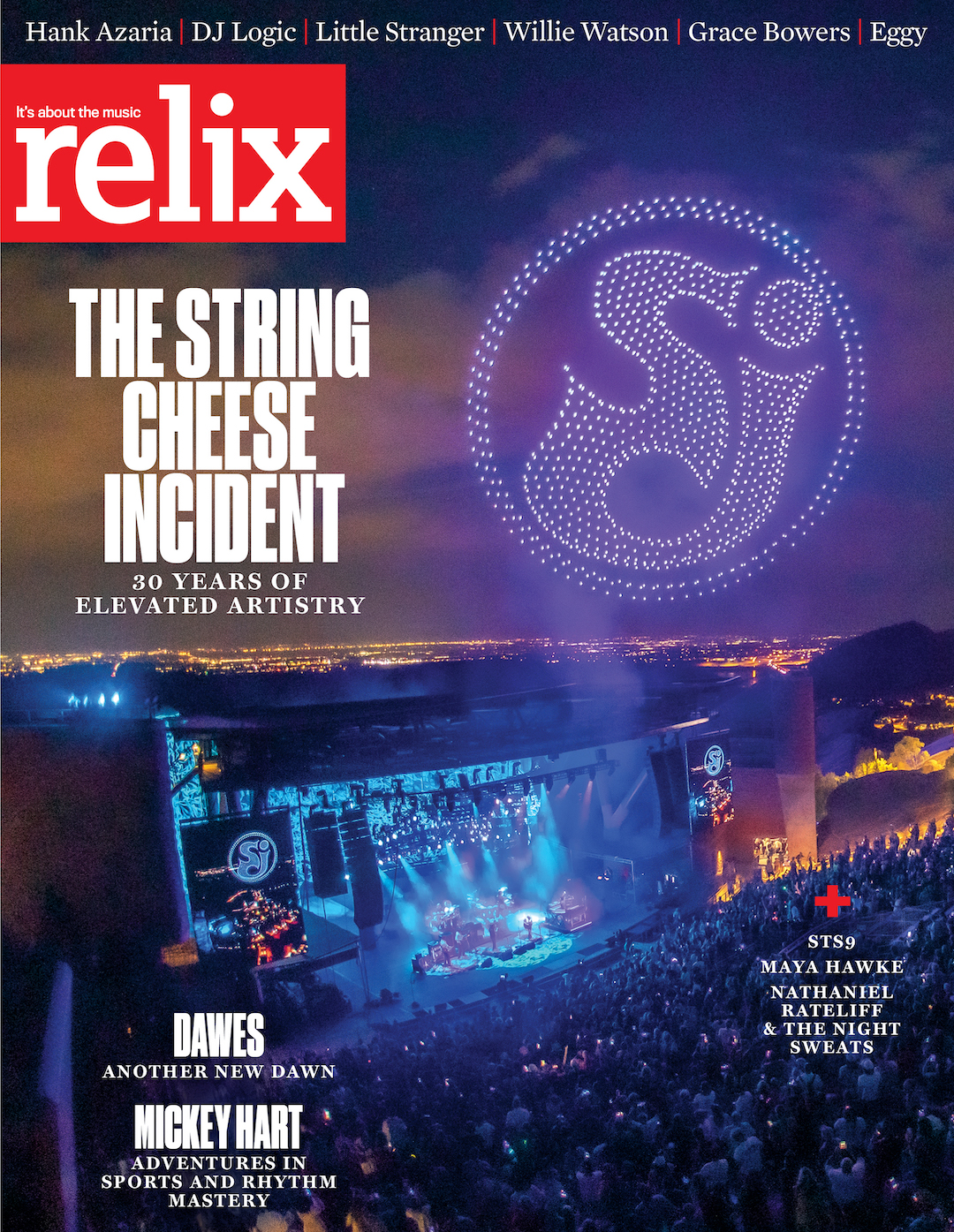Derek Trucks: Sweet Inspiration (Relix Revisited)
The Tedeschi Trucks Band will open their transcontinental year-end run tonight in Jacksonville at the Florida Theatre. Back in February 2009 Derek Trucks spoke with Relix about creating the home studio where he and Susan would later record, working with his wife and extended family as well as the arc of the Derek Trucks Band.
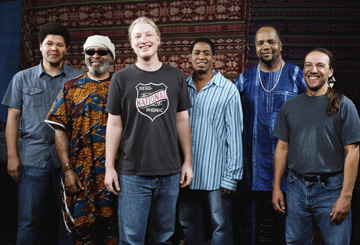
While it’s more than two and a half months before the official release of The Derek Trucks Band’s sixth studio recording on this unseasonably warm, late October evening in Connecticut, the impact of the forthcoming album resonates nonetheless.
The DTB is making its eighth consecutive fall appearance at The Mohegan Sun Casino’s Wolf Den, taking the stage in climate-controlled comfort with the lone distraction offered by the chiming of the surrounding slot machines disgorging their winnings in the key of middle C. There is some element of cognitive dissonance as the group’s deadly earnest band leader wields his Gibson SG before a faux-rock façade ringed by animatronic wolves. But on another level, this performance in a venue that his bandmates affectionately describe as surreal, also affirms Trucks’ view that music and not its adornment should be paramount: If the intent is true then the setting can be irrelevant (although one may have to push the pedal down a little harder to compensate for the slots).
The group’s visits to the Den have provided annual touchstones to assess the state of the band and its following. Judging by the entrance queue for this general admission show, which extends well beyond the gaming floor more than two hours before show time, interest in the group is at an all-time high. Correspondingly, it is no coincidence that when the sextet eventually kicks into its opening number, a spirited cover of Bob Dylan’s “Down in the Flood” that as a performance ensemble, The Derek Trucks Band is in fine fettle as well.
The song carries weight beyond the fact that it is the quintessence of a successful cover, which honors the original composition yet flavors it with local seasonings – it represents the first track and advance single from Already Free. “Down in the Flood” also merits note as it reflects a series of new tunes the band has placed into rotation after a extended stretch in which Trucks and the group engaged in a series of pursuits that helped to raise the profile of the DTB, yet limited its ability to invigorate performances with new material.
“I think we were a little log-jammed there, especially late last year, early this year,” vocalist Mike Mattison affirms. “But I think it’s all flowing again. When you start recording and you’re crafting new stuff, it’s a difficult time to add new music to the set. You don’t necessarily want to show your hand and a lot of the songs are still in flux. It’s nice now finally to be able to play the stuff we’ve worked so hard on. Then once you start playing live, it inspires you to go out and write more and bring more stuff into the fold. But yes, we did get a little bottlenecked there.”
It’s also fair to say, on an altogether different level, that given Derek Trucks’ prodigious talent on guitar, that the band will be more than a little bottlenecked for some time to come. Indeed, it is worth stipulating from the outset that Derek Trucks is one of the preeminent guitarists in the world today. Playing without a pick and typically placing a vintage glass Coricidin medicine bottle over his left hand ring finger (the same slide favored by Duane Allman), Trucks has long distinguished himself for the range of tones he can evoke, from gorgeous, often yearning melodic passages to sharp, stinging leads.
Bassist Todd Smallie, who has performed more than 2,000 gigs with Trucks over the past decade and a half, ever since Jeff Sipe and Jimmy Herring introduced him to the then 14-year-old guitarist, observes, “He just has a real natural sense to be lyrical. When I first joined the band he reminded me of a Wayne Shorter-type musician; he just had an incredible sense of tone and harmony. From the beginning he could really dig in to the melody and make it sound like a person singing. He talks like this is something he just got into lately but it’s been his trademark from the beginning, even if he didn’t know it.” The results have earned the guitar player a fair share of lofty admirers.
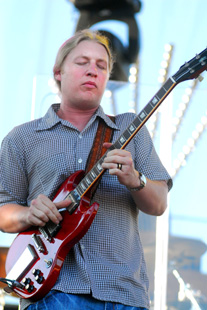
Carlos Santana, who invited the DTB to open a series of shows this past spring, took the time to recommend songs for the group’s repertoire, including a cover of Dan Penn and Spooner Oldman’s “Sweet Inspiration,” which receives a bright, uplifting treatment on Already Free, with Derek’s wife, Susan Tedeschi, on background vocals.
“He reached out a few years ago,” Trucks recalls. “I guess he had heard a record and I got a package in the mail with these silkscreened John Coltrane sweaters and some music he wanted me to listen to. Then every time my band would play San Francisco or Susan would play San Francisco we’d get to the dressing room and there would be flowers from Carlos. This was before I ever met him.”
The relationship flourished during the April 2008 shows and Trucks’ appreciation for Santana reflects his own musical values. “I loved the fact that even with all the success he’s had, there he was at soundcheck an hour before his band getting his tone right and thinking about new tunes for the set. He’s out there pushing the envelope every night. I would sit in with him on three or four tunes and it would be a different song each night, sometimes the band hadn’t played them in a year. He was really in the moment and if he was inspired by something then you jump in line and go.”
Another prominent admirer is Eric Clapton, who has described Trucks’ playing as “stunning, like nothing I had ever heard before. He has clearly grown up listening to many different forms of music and all of them come through in his expression.”
Such a testimonial came with an invitation for Trucks to join Clapton’s 2006/07 world tour.
“It’s a lot different than the Allman Brothers gig where there’s no clear leader. With the Allman Brothers, who’s taking charge changes on a song by song basis and sometimes there’s different people within a tune. With an Eric Clapton band, it’s Eric Clapton. But he didn’t really tell you how he wanted you to play something. Once he decided he wanted these individuals in the band he trusted them to do what they do. If there was something that was bugging him or something that was out of balance, he had no problem getting it the way he wanted it but he was pretty wide open. Halfway through the tour we were egging him on to do more and more Dominoes tunes and by the end of the tour we were pretty much doing the whole record [Derek and The Dominos’ 1970 release Layla and Other Assorted Love Songs, where Clapton found a like-minded spirit in Duane Allman].”
“Eric was really gracious with the amount of solo time he gave me and Doyle [Bramhall II]. I was playing in front of an audience of 15,000 people where maybe a few hundred people have heard of me and it was a challenge to keep people on my side. They paid their money to see Eric and I’m playing, so you have to make it count. You have to make people interested right out of the gate.”
Mattison recalls a DTB field trip to one of Trucks’ initial gigs with Clapton, which affirmed the pressure associated with delivering some of Slowhand’s signature licks.
“We’d been telling him that he was going to be the one playing the intro to ‘Wonderful Tonight.’ He’d come on the bus and we’d sing it to him. So later we were in the audience at Royal Albert Hall and when they did ‘Wonderful Tonight,’ sure enough, Derek played it. Then he looked up to where we were sitting and we all just cracked up. Anytime Clapton touches the guitar people freak out but to have people slowly realize this other guy can play just made us real proud.”
This was a rather intensive period for Trucks, a married father of two young children. “The biggest challenge was just being gone for a solid year. It was a month and a half on, a few weeks off, then a month and a half on. I was gone quite a bit, so I flew in the family. They were in the south of France for two weeks, they were in London for a few weeks, they were in Japan. We had a blast but it’s expensive and chaotic.”
What’s more, during his “down time,” he was weaving in his commitments with The Allman Brothers Band and his own group.
In response, Derek carved out a six-week window in early 2008 where he would remain at home in Jacksonville, Florida. This period represented, in his estimate, the longest break he’d taken from the road since he was a young teen. As he looked ahead to that time, he began mapping out plans to create a rehearsal space behind his house, a goal later modified to encompass a world-class recording facility. There, the demoing of new material swiftly transformed into the cutting of an album, one in which Trucks utilized a recording method he had long eschewed.
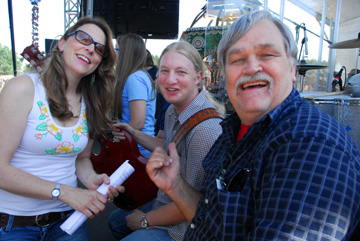
“Bruce [Hampton] used to call him an old black lady, a 40-year-old black woman with the blues,” says Trucks.
Count M’Butu, laughs at the memory. M’Butu, the DTB percussionist and elder statesmen of the group at age 63, was performing with Hampton in Aquarium Rescue Unit, when he first encountered the young guitarist.
“Derek was about 11 or 12 when Bruce brought him out. Some people were so nervous playing with Jimmy [Herring] and those cats, one guy couldn’t even plug his guitar in. Well Derek walked right out and plugged into Jimmy’s amp, turned to me and Oteil and said, ‘Let’s go.’ It kind of blew us away, the kid was so calm.”
Trucks’ quiet confidence has long defined him as much as his guitar finesse. His bandmates all describe his penchant, both on and offstage, for putting his head down and getting things done. This is quite literally true in terms of his performance demeanor as he exhibits minimal displays of emotion, to which he responds, good naturedly, “There’s a lot of activity you enjoy in life where you don’t just grin the whole time. I think part of the enjoyment is being deadly focused on something and trying to push the bar a bit every night. There’s a huge amount of enjoyment and feeling of doing something and intellectually pushing yourself and emotionally pushing yourself and just leaving it out on the stage.”
However, Trucks acknowledges that particularly in his role of bandleader, he has become increasingly assertive.
“Over the last four or five years I’m really starting to feel comfortable asking people what I want or telling guys what I want. I don’t feel like I have to tiptoe around things so much. I feel much more comfortable saying, ‘This is what the song calls for, this is how we’re doing it,’ and not really worrying about how the chips are going to fall.”
Not even if this means displacing his emcee. For many years drummer Yonrico Scott, who joined the DTB shortly after Todd Smallie and sports a résumé that includes gigs with Peabo Bryson, Sonny Stitt and John Denver, took the initiative to announce song titles to the audience. “And then,” Scott recalls, “one day Derek said, ‘Don’t talk.’ If you look at the presentations of some of the major bands, they don’t talk. Miles Davis didn’t say a freaking word. He just walked out and bam! With us it’s not hokey, it’s artistic. There was an Eddie Bo tune we did where the Count would come out at the end with an umbrella and do a little dance and we did that for about a minute because that’s not how we roll.”
Trucks affirms, “As a band were not trying to be cute or one up the audience. It’s not flippant what we do and it’s not just entertainment. It’s not a garage band that just hit on some weird chemistry and settled into it. Everybody has spent many years learning and studying their craft. These are guys who have been on the road playing in hugely different situations for 30, 40 years. A lot of times you’re trying to move or impress the people in your band who have heard you every night for 15 years.”
The Derek Trucks Band is the only touring group in recent memory comprised of a member in his 20s (Trucks), 30s (Smallie and Mike Mattison), 40s (keyboard player Kofi Burbridge), 50s (Scott) and 60s (M’Butu). The Count is a great-grandfather. Scott is a father of two children in their 20s. Within this setting, it is understandable that Trucks finally became a bit more declarative with his band members, when his life outside the group took on additional responsibility and perspective following the birth of his first son, Charlie.
Family is exceptionally important to Trucks, who credits his own formative musical experiences and development less to the fact his uncle Butch was a founding member of The Allman Brothers Band than his parents own reverence for music ( “I can remember watching my dad moved to tears by a Duane Allman solo or listening to a Joni Mitchell record with my mom and seeing how it affected her.” ). By all accounts he’s a doting and devoted father who believes that “sometimes a little league game is more important than doing a gig or learning a new tune.” When he’s home, he draws morning carpool duty and takes joy in the experience: “I pick up the neighbor’s kids, and everyone is asking for certain tunes like John Lennon’s ‘So this is Christmas.’ And there’ll be a car full of four kids just belting it at the top of their lungs at 8 a.m. It’s pretty amazing.” For the record, there is, however, no Hannah Montana in the offing as Trucks explains, “Sometimes you have to draw a line in the sand. I feel so strongly that the things you watch, the things you read, the things you listen to affect how you are as a person. And for me, that music is so throwaway. With me and Susan being musicians, we take music seriously. If my thing was a nutritionist, I wouldn’t want my kids eating junk food all the time and I feel the same way about music and culture.”
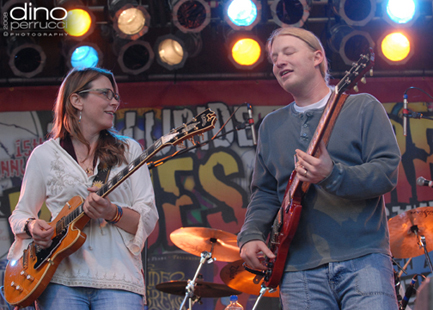
Photo by Dino Perucci
Given his devotion to his family, Trucks feels an increased internal pressure to be around the house. He has no plans to return to the road with Clapton, citing his other responsibilities. What’s more, Trucks can envision a future when he might step away from The Allman Brothers Band.
“There does come a point where you have to say, ‘There’s only so much time in a day and only so many days in a year.’ I have kids who are six and four, and a wife who has sacrificed quite a bit so that I could do the three gigs. She’s put her career on hold at different times to have babies and things like that. I feel there comes a time where I’m going to have to look at my situation and return the favor. It’s only right.”
The home studio represents a step toward this end. Originally envisioned as a rehearsal room, the project soon escalated, aided by Derek’s discovery that Bob Tis, the father of his guitar tech, Bobby Tis, had served as chief engineer at both Bearsville and Electric Lady Studios and consulted on the design of numerous recording spaces. The elder Tis was soon enlisted to provide blueprints and then helped secure equipment, including a vintage Neve recording console previously owned by The Kinks.
As soon as the construction came together, Trucks invited Mattison down, and the vocalist bunked above the studio-in-progress, while the pair took a stab at some new material.
“As we were beginning,” Mattison remembers, “the shell was in, they had just put the board in but there were a lot of raw wires. And as the studio came together, the music also started to get momentum, so there was an interesting parallel there to watch both things happening.”
“The original idea was just to mess around and figure out how to get sounds,” Trucks adds, “and the first tune we tracked was ‘Already Free’ which is the last tune on the record. It was just me playing guitar, Bobby Tis stomping his foot on the ground and Mike singing. Once we realized that everything was sounding amazing in terms of the sound of the studio, it really blossomed. It was really uplifting. The kids were running around the yard and we were writing a song a day, tracking a song a day, mixing a song a day. It was pretty amazing.”
The setting certainly had an impact on the recording, which feels looser, more animated and more true to the spirit of the band that its predecessors. Count M’Butu contrasts the situation with some of his prior experience in more sterile environments where “the musicians tend to turn professional on you, and just play with the music with no life. But here we’d kind of hang out, record, come out into this big backyard and play baseball or walk through the woods to the swamp and see alligators and manatees. Then we’d go back and create songs. It’s just fun.”
As the project moved forward, additional guests stopped by as well. A visit from Doyle Bramhall yielded half a dozen tunes that had been hanging in the air since the Clapton tour, two of which appear on the album. Warren Haynes came down to write new music for The Allman Brothers Band, which never made it to the stage due to Gregg Allman’s treatment for hepatitis C but may well surface this year (Here’s some bonus ABB dish: When asked about the likelihood of Dickey Betts returning to the stage with the group during its 40th anniversary shows at New York’s Beacon Theater in March, Trucks offers “I don’t really know but I would say it’s even money or better.” ). Along the way, Haynes contributed lyrics to the gentle “Back Where I Started,” music Derek originally composed on acoustic guitar to calm down his children at bedtime, which really hits home with Susan on lead vocals.
The process also opened up Trucks to new production possibilities with “Down in the Flood” recorded backwards, starting with an acoustic guitar and shakers, leading up to the drum tracks added at the very end. “I was always against recording any way other than setting the band up, tracking it live and capturing that. But there are a lot of other emotions, feels and vibes you can get by just rethinking the process. If something great comes out of it then so be it.”
Along these lines, it is worth noting that the definitive Derek Trucks Band album doesn’t always feature the Derek Trucks Band. Tedsechi’s rhythm section of Ted Pecchio (bass) and Tyler Greenwell (drums) who were on hand doing pre-production for her record and also have appeared with Mattison’s Scrapomatic project, contributed to the gestation of some songs while the full DTB was away. As a result, Trucks opted to record with them because “it just seemed like the right way to do it. I didn’t want to force it away from that. And strangely, while this record has the most diverse line-up, it feels the most coherent to me. There’s a common thread which I think is me being at home, being comfortable and just writing tunes every day. It was much more the atmosphere and the ambience and 15 years of being on the road and finally settling down and just being able to feel relaxed and write music.”
So too Already Free achieves one of Trucks’ fundamental goals in that it feels unfailingly honest. The music is familiar; classic but not quite retro. It is timeless, unfolding in the moment. The same holds true for most any Derek Trucks Band performance, whether it takes places in its namesake’s Florida backyard or a tricked-out Connecticut casino lounge.
“Music is putting the emotion of the day into sound,” Trucks concludes. “So when I hear somebody play or I buy somebody’s record, I want to think I’m getting an honest representation of who they are, what they feel and how they think. To me that’s the whole point. I don’t want half of a story.”


